 We just completed an extensive upgrade to CommercialMortgage.com ("CMDC") that now allows us to immediately deliver commercial loan leads directly to commercial lenders and commercial mortgage companies by email. The cost to receive these leads is only $1,000 per year.
We just completed an extensive upgrade to CommercialMortgage.com ("CMDC") that now allows us to immediately deliver commercial loan leads directly to commercial lenders and commercial mortgage companies by email. The cost to receive these leads is only $1,000 per year.
The cost of $1,000 per year is absurdly cheap. Any commercial lender who has ever paid for Google Adwords or display ads in digital magazines or e-zines will tell you that his company paid MUCH more than $1,000 per year.
You will receive these commercial loan leads instantly, so you can catch the borrower while he is still sitting in front of his computer. Here is what a sample lead looks like:
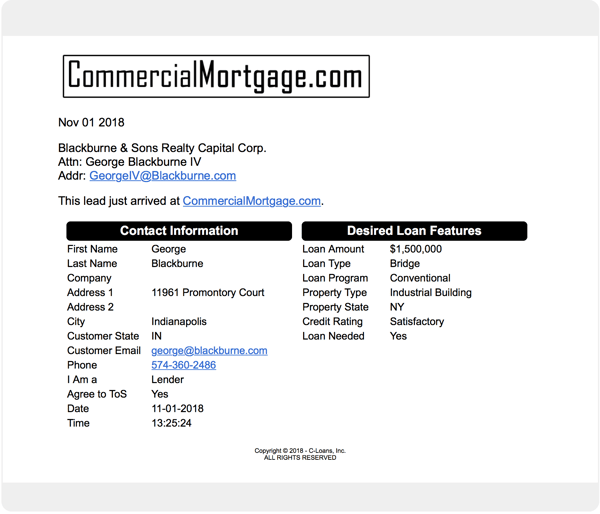
Guys, please don't call this lead. I appreciate your work ethic, but its just an imaginary sample lead. Please note that imaginary borrower is me. Watch, I'll still get three or four calls. "Hey, I hear you need a $1.5MM loan on an industrial building in New York." Ha-ha!
When a commercial lender advertises on Google Adwords or in some digital magazine, the commercial loan leads are likely to be pretty poor. Why? Because there is no way to fine tune the leads that he's receiving. A commercial lender might pay Google $3,000 per month, only to get leads like a $42,000 bridge loan on a commercially-zoned house in Detroit or a $2 million mezzanine loan on a parking garage in Maine.
When you advertise on CommercialMortgage.com, you get to specify the exact type of commercial loan leads that you want to receive. For example, if you only make bridge loans on the four basic food groups, plus hospitality, in the five states located close to New York City, from $1 million to $15 million, this is exactly the type of commercial loan leads that you will receive. (The four major food groups are multifamily, office, retail, and industrial.)
If you are unfamiliar with CommercialMortgage.com ("CMDC"), this commercial mortgage portal contains a searchable list of 3,159 different commercial lenders. By the way, I paid $100,000 to get that wonderful domain name, CommercialMortgage.com. The vast majority of these commercial lenders are commercial banks.
Here is what the search results look like:
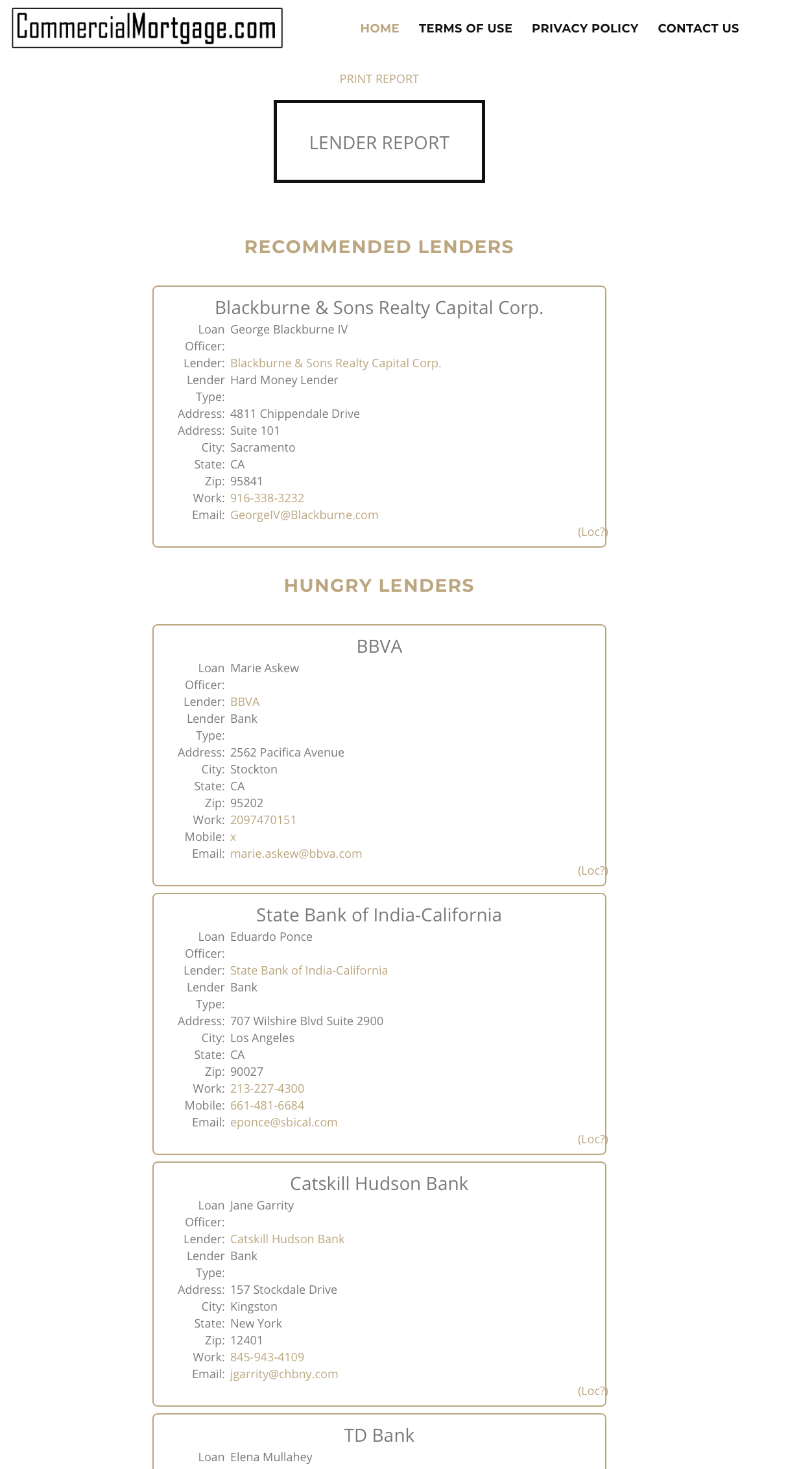
The site is 100% free to use by borrowers, mortgage brokers, and commercial brokers. The banks listed do NOT increase their loan fee to pay any fee to C-Loans, Inc., the owner of CommercialMortgage.com. Banks and credit unions get a free listings. Until now, no other commercial lenders could gain a listing on CMDC - only banks and credit unions were allowed to join.
 As a result, there are very few competing bridge lenders listed on the portal. This lack of competition for bridge loans should be very good news for bridge lenders who are considering an investment of - gasp - $1,000 per year to receive a steady supply of pre-qualified bridge loan leads. (Can anyone guess why I have added the picture of Dr. Evil here? We will hold the world to ransom for - gasp - $1 million! Ha-Ha!) How much do you make if you close a deal? And remember, unlike on C-Loans.com, you do NOT owe us 50 bps. if you close a deal. (If your boss will never authorize an investment of $1,000; you can always join C-Loans.com for free.)
As a result, there are very few competing bridge lenders listed on the portal. This lack of competition for bridge loans should be very good news for bridge lenders who are considering an investment of - gasp - $1,000 per year to receive a steady supply of pre-qualified bridge loan leads. (Can anyone guess why I have added the picture of Dr. Evil here? We will hold the world to ransom for - gasp - $1 million! Ha-Ha!) How much do you make if you close a deal? And remember, unlike on C-Loans.com, you do NOT owe us 50 bps. if you close a deal. (If your boss will never authorize an investment of $1,000; you can always join C-Loans.com for free.)
The cost to receive these leads is $1,000 per year per loan type. For example, if your hard money mortgage company makes both permanent loans and bridge loans, the cost to receive permanent commercial loan leads would be $1,000 per year, and the cost to receive bridge loan leads would be another $1,000 per year.
Small bridge loan lenders will be disappointed to learn that we do NOT sell permanent loan and bridge loan leads of less than $1 million. There are reserved for Blackburne & Sons, my own hard money shop. Between loans fees and loan servicing income, I make over $300,000 on a loan of $1 million. Blackburne & Sons, however, doesn't make either permanent loans or bridge loans larger than $1 million, so these are the leads that are available.
What if you are an SBA lender? Yes, you can buy the smaller SBA and USDA leads. Blackburne & Sons does not make SBA loans, USDA loans, or construction loans of any size.
What if you are commercial mortgage broker? Can you get listed on CMDC for $1,000 per year? Only if you do not call me up and ask a lot of questions. If $1,000 per year is a lot of money to you, you are just not the size of commercial mortgage company that I would allow to slip onto CMDC. Moral of the story: If you are a small operation, do NOT call George. Just send in your dough.
Owners of hard money shops and approved SBA lenders are, of course, absolutely invited to call me, the old man, George Blackburne III, at 574-360-2486.
Now there is a bit of a race going on. Let's look again at the results of a Lender Report:

Do you see the the section above entitled Recommended Lenders? Blackburne & Sons will, on perm's and bridge loans of less than $1 million, always be listed first. After that, the order depends on how soon you send in your dough. Red Star Mortgage has already sent in their dough, so on deals larger than $1 million, they will be listed first. The next lender to send in his dough gets listed second, etc. (Remember, this update to CMDC that allow us to send leads out to lenders was just completed last night, November 1, 2018.)
Next year, if Red Star doesn't renew, then the #2 lender moves into the #1 spot, and every renewing lender moves up one place.
Fair warning. If the site takes off, and a new lender offers me $1,500 per year, he grabs the #1 spot. I will probably just go up in $500 increments.
Let's suppose you're sold. You've known of 'ole George Blackburne III for decades, and you trust that he is proven rainmaker. If so, you need to rush your check or wire, made payable to C-Loans, Inc., to Justine Manzo, our Controller, at 4811 Chippendale Drive, Suite 101, Sacramento, CA 95841. Justine's number is 916-338-3232.

 Today's article is targeted at commercial loan brokers, and its about where to market for commercial loans. Please stop. Are you a
Today's article is targeted at commercial loan brokers, and its about where to market for commercial loans. Please stop. Are you a 








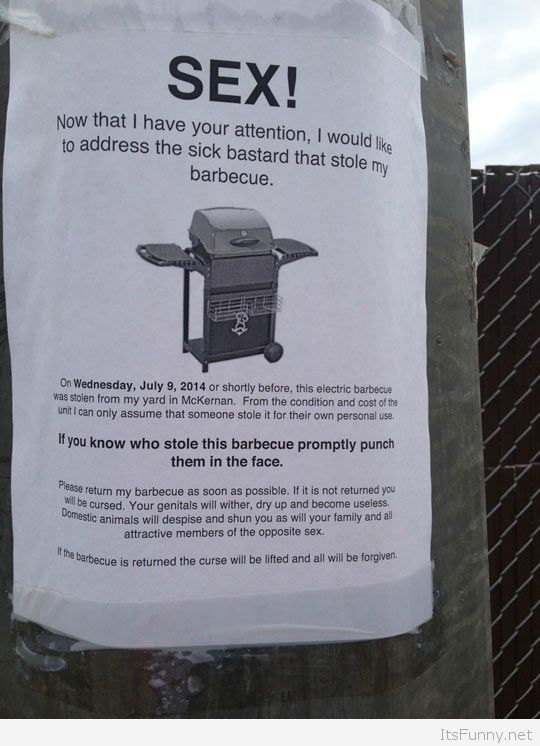














 All of my readers should read today's article, including commercial loan brokers, commercial brokers, real estate investors, and developers.
All of my readers should read today's article, including commercial loan brokers, commercial brokers, real estate investors, and developers.



 When a Developer goes to build a new commercial building, the construction lender will require that the Developer contribute 20% to 40% of the Total Cost of the Project. That contribution takes the form of equity in the land; prepaid costs, such as architectural and engineering fees; and cash added at the close of the loan.
When a Developer goes to build a new commercial building, the construction lender will require that the Developer contribute 20% to 40% of the Total Cost of the Project. That contribution takes the form of equity in the land; prepaid costs, such as architectural and engineering fees; and cash added at the close of the loan.















 Commercial Loan Tidbit: I learned tod
Commercial Loan Tidbit: I learned tod



















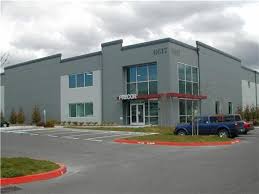 In a
In a 


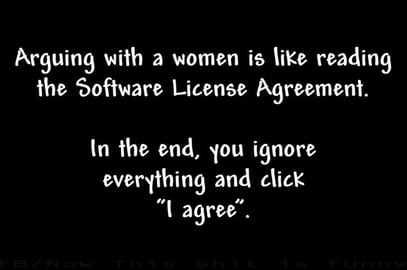






 Apart from construction loans, there are three types of commercial loans in first position - the permanent commercial loan, the mini-perm, and the bridge loan.
Apart from construction loans, there are three types of commercial loans in first position - the permanent commercial loan, the mini-perm, and the bridge loan.








